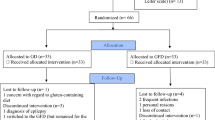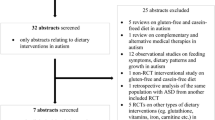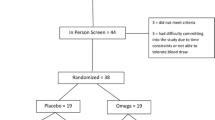Abstract
To examine the effects of a digestive enzyme supplement in improving expressive language, behaviour and other symptoms in children with Autism Spectrum Disorder. Randomized, double-blind placebo-controlled trial using crossover design over 6 months for 43 children, aged 3–8 years. Outcome measurement tools included monthly Global Behaviour Rating Scales, Additional Rating Scales of other symptoms by parents and therapists, and monthly completion of the Rescorla Language Development Survey. Compared with placebo, treatment with enzyme was not associated with clinically significant improvement in behaviour, food variety, gastrointestinal symptoms, sleep quality, engagement with therapist, or the Language Development Survey Vocabulary or Sentence Complexity Scores. A small statistically significant improvement on enzyme therapy was seen for the food variety scores. No clinically significant effect improvement of autism symptoms with enzyme use was shown with this trial, however, possible effects on improvement in food variety warrants further detailed investigation.

Similar content being viewed by others
References
Aman, M. G., & Singh, N. N. (1986). Aberrant behavior checklist: Manual. East Aurora, NY: Slosson Educational Publications.
American Psychiatric Association. (2000). Diagnostic and statistical manual of mental disorders: DSM-IV-TR. Washington, DC: Author.
Autism and Developmental Disabilities Monitoring (ADDM) Network. (2007). Prevalence of the autism spectrum disorders in multiple areas of the United States, surveillance years 2000 and 2002. http://www.cdc.gov/ncbddd/dd/addmprevalence.htm. Retrieved 27 July 2007.
Brudnak, M. A., Rimland, B., Kerry, R. E., Dailey, M., Taylor, R., Stayton, B., et al. (2002). Enzyme-based therapy for autism spectrum disorders–Is it worth another look? Medical Hypotheses, 58(5), 422–428.
D’Eufemia et al. (1996). Abnormal intestinal permeability in children with autism. Acta Paediatrica, 85, 1076–1079.
Hanson, E., Kalish, L. A., Bunce, E., Curtis, C., McDaniel, S., Ware, J., et al. (2007). Use of complementary and alternative medicine among children diagnosed with autism spectrum disorder. Journal of Autism and Developmental Disorders, 37(4), 628–636.
Horvath, K., et al. (1999). Gastrointestinal abnormalities in children with autistic disorder. Journal of Pediatrics, 135, 559–563.
Houston, D. (2009). Houston Nutraceuticals Inc. Peptizyde product information accessed 24/12/09 via https://www.houston-enzymes.com/store/product.php?p=6&c=1.
Levy, S. E., Souders, M. C., Wray, J., Jawad, A. F., Gallagher, P. R., Coplan, J., et al. (2003). Children with autistic spectrum disorders. I: Comparison of placebo and single dose of human synthetic secretin. Archives of Disease in Childhood, 88, 731–736.
Matson, J. L., & Fodstadt, J. C. (2009). The treatment of food selectivity and other feeding problems in children with autism spectrum disorders. Research in Autism Spectrum Disorders, 3, 455–461.
Millward, C., Ferriter, M., Calver, S., & Connell-Jones, G. (2008). Gluten- and casein-free diets for autistic spectrum disorder. Cochrane Database of Systematic Reviews, (2). Art. No.: CD003498. doi:10.1002/14651858.CD003498.pub3.
Reichelt, K., & Knivsberg, A. M. (2003). Can the pathophysiology of autism be explained by the nature of the discovered urine peptides? Nutritional Neuroscience, 6(1), 19–28.
Rescorla, L. (1989). The language development survey: A screening tool for delayed language in toddlers. Journal of Speech and Hearing Disorders, 54, 587–599.
Sparrow, S. S., Balla, D. A., & Cicchetti, D. (1984). Vineland adaptive behavior scales. Minnesota: AGS Publishing.
Wakefield, A. J., Puleston, J. M., Montgomery, S. M., Anthony, A., O’Leary, J. J., & Murch, S. H. (2002). Review article: The concept of enter-colonic encephalopathy, autism and opioid receptor ligands. Alimentary Pharmacology & Therapeutics, 16, 663–674.
Weber, W. (2007). Complementary and alternative medical therapies for attention-deficit/hyperactivity disorder and autism. Pediatric Clinics of North America, 54, 983–1006.
Wetherby, A., & Prizant, B. M. (1993). Communication and symbolic behavior scales. New York: Applied Symbolix.
White, J. F. (2003). Intestinal pathophysiology in autism. Experimental Biology and Medicine, 228, 639–649.
Acknowledgments
The authors wish to extend their sincere gratitude to the children and families who so willingly gave their time to make this study possible. We would also like to thank Dr Devin Houston (PhD) and Houston Nutraceuticals for their willingness to allow this product to be examined in a controlled trial and assistance with providing product and placebo capsules for the study. We also wish to thank Margaret Shave (Clinical Trials Pharmacist, Princess Margaret Hospital, Perth, Western Australia) for her invaluable contribution to the study. The authors wish to acknowledge the support with respect to statistical analyses given by Gavin Pereira (University of Western Australia) and Elaine Pascoe (Child and Adolescent Health Service, Princess Margaret Hospital, Perth, Western Australia).
Author information
Authors and Affiliations
Corresponding author
Rights and permissions
About this article
Cite this article
Munasinghe, S.A., Oliff, C., Finn, J. et al. Digestive Enzyme Supplementation for Autism Spectrum Disorders: A Double-Blind Randomized Controlled Trial. J Autism Dev Disord 40, 1131–1138 (2010). https://doi.org/10.1007/s10803-010-0974-2
Published:
Issue Date:
DOI: https://doi.org/10.1007/s10803-010-0974-2




